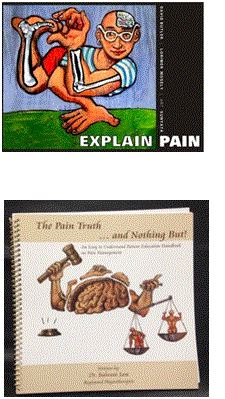Pain Education Effective for WADs
Reference:Van Oosterwijck J, et al Pain neurophysiology education improves cognitions, pain thresholds, and movement performance in people with chronic whiplash: a pilot study. J Rehabil Res Dev. 2011;48(1):43-58.
Whiplash Associated Disorders (WAD II) have traditionally been considered to be simply a painful condition related to benign “soft-tissue” injuries, with an expected recovery time of 6 weeks! Yeah right!
Based on growing evidence, many patients with WADs have been shown to have more than just a “simple soft tissue injury”, as they develop central sensitization and maladaptive illness beliefs.
The purpose of this pilot study was to look at the efficacy of pain neurophysiology education on patients with persistent WADs. All patients received two 30-minute one-on-one educational sessions on basic pain neurophysiology.
They showed that patients with chronic WAD who received only 2 sessions of pain education had significant decreases in kinesiophobia, passive coping strategy of resting, self-rated disability, and photophobiaafter 1,2 and 3 weeks.
At the same time, the patients had significant increases in pain pressure thresholds and improved pain-free active neck extension and Brachial Plexus Provocation Test (Median n. neurodynamic tests).
Within 3 weeks of education, perceived VAS pain on active neck extension decreased by 43%.
Conclusion: Current evidence supports the notion that PTs are able to influence negative thoughts and pain behavior through appropriate pain neurophysiology education. Therefore, rehabilitation of patients with acute, sub-acute and chronic WAD, should ideally always include this intervention with the focus on changing inappropriate pain beliefs. This is all to reduce the “Threat Value” of pain.
Please answer the 20 questions on the The Pain Truth Test and see how you do. Then photocopy it for your patients. If you don?t get a perfect score (20/20), then please re-read The Pain Truth.
Posted on: December 20, 2013
Categories: Cervical Spine , Fascinating Pain Studies


